|
Humor is something I never expected from the WPA Listserv. Going into this assignment I fully expected a few dull posts about composition studies and possibly the occasional heated argument that may get out of hand enough to entertain me slightly. I am happy to say that I may have found a golden nugget of comedy today. I am by no means a reader of the Washington Post, nor am I a reader of newspapers/news outlets in general. I tend to stay away from new stories, but after reading about The Washington Post's article I may change that. Long story short, they challenged readers to take a word, change, remove or add a single letter and give that word a brand new definition. They also provided a secondary and, in my opinion, a much harder challenge of creating a new definition for an existing word. What followed was easily some of the best usage of pun-humor I have ever seen. (Aren't you glad I didn't say punny?) Here is a list of my personal favorite from the invented words: (Disclaimer: All implied opinions are my own and do not reflect anyone else who may post to this blog.) 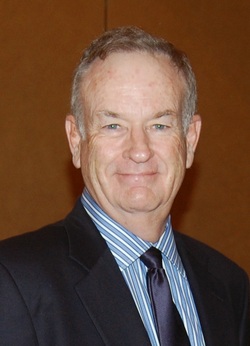 Ignoranus: A person who's both stupid and an asshole. 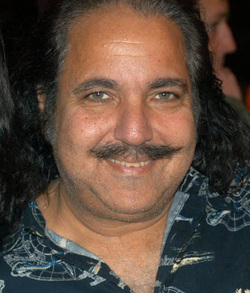 Osteopornosis: A degenerate disease.  Sarchasm: The gulf between the author of sarcastic wit and the person who doesn't get it. And now for the invented definitions:  Coffee, n. The person upon whom one coughs. 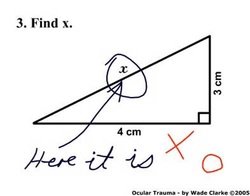 Testicle, n. A humorous question on an exam.  Willy-nilly, adj. Impotent. I am impressed by the low brow humor that made its way to the WPA Listserv. As a logophile I truly appreciated this.
Here is a list of all the winners for the invented words: § Cashtration (n.): The act of buying a house, which renders the subject financially impotent for an indefinite period of time. § Ignoranus: A person who's both stupid and an asshole. § Intaxication: Euphoria at getting a tax refund, which lasts until you realize it was your money to start with. § Reintarnation: Coming back to life as a hillbilly. § Bozone (n.): The substance surrounding stupid people that stops bright ideas from penetrating. The bozone layer, unfortunately, shows little sign of breaking down in the near future. § Foreploy: Any misrepresentation about yourself for the purpose of getting laid. § Giraffiti: Vandalism spray-painted very, very high. § Sarchasm: The gulf between the author of sarcastic wit and the person who doesn't get it. § Inoculatte: To take coffee intravenously when you are running late. § Osteopornosis: A degenerate disease. (This one got extra credit.) § Karmageddon: It's like, when everybody is sending off all these really bad vibes, right? And then, like, the Earth explodes and it's like, a serious bummer. § Decafalon (n): The grueling event of getting through the day consuming only things that are good for you. § Glibido: All talk and no action. § Dopeler Effect: The tendency of stupid ideas to seem smarter when they come at you rapidly. § Arachnoleptic Fit (n.): The frantic dance performed just after you've accidentally walked through a spider web. § Beelzebug (n.): Satan in the form of a mosquito, that gets into your bedroom at three in the morning and cannot be cast out. § Caterpallor (n.): The color you turn after finding half a worm in the fruit you're eating. And the winners for the invented definitions: § Coffee, n. The person upon whom one coughs. § Flabbergasted, adj. Appalled by discovering how much weight one has gained. § Abdicate v. To give up all hope of ever having a flat stomach. § Esplanade, v. To attempt an explanation while drunk. § Willy-nilly, adj. Impotent. § Negligent, adj. Absent-mindedly answering the door when wearing only a nightgown. § Lymph, v. To walk with a lisp. § Gargoyle, n. Olive-flavored mouthwash. § Flatulence, n. Emergency vehicle that picks up someone who has been run over by a steamroller. § Balderdash, n. A rapidly receding hairline. § Testicle, n. A humorous question on an exam. § Rectitude, n. The formal, dignified bearing adopted by proctologists. § Pokemon, n. A Rastafarian proctologist. § Oyster, n. A person who sprinkles his conversation with Yiddishisms. § Frisbeetarianism, n. The belief that, after death, the soul flies up onto the roof and gets stuck there. § Circumvent n. An opening in the front of boxer shorts worn by Jewish men --Evan
1 Comment
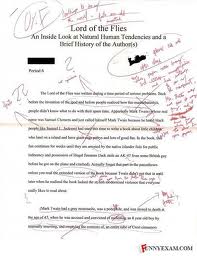
We've all experienced getting a paper back that has an A, B, C, D grade with no comments on it. Well why not, I didn't just stress over this 8-10 page paper for you to not respond to what I just wrote my heart out for your class. A majority of us may find it annoying. But then you have some teachers who conversate with everything you have to say- agree with your statements, commence you for your effort, compliment on your style. This positive reinforcement is what drives students to feel good about themselves and also allows the teacher to let students know that WHAT THEY HAVE TO SAY MATTERS. The WPA lister this weekend had an overwhelming response to the post: How can I (the teacher) cut back on responding to student writing. This sunday post had about 10 replies by Monday morning. Mostly, teachers were arguing, "DON'T!" A teacher isn't really teaching or involving themselves until they're writing with their students. I see it as this, you compliment a girl on the color she's wearing and I'm sure that color will be entering her wardrobe much more than before. Same goes for a teacher commenting on student writing, if the teacher has positive insights to add to your paper, it's a huge positive reinforcement to where the student stands in the class. I feel its even more valuable than a letter grade. Teacher's are letting you know where you stand in your writing by simply having a conversation with you. It also is nice to know that all those hours you spent writing that paper at least has something to show for rather than a simple "you got an A." OR Are some teachers afraid that their excessive comments of greatness will then lead the student to slack off and not try as hard? One of the comments on the list says that students will become too confident with the teacher's feedback. My thoughts on that attitude seems a little like this We ALL need positive reinforcement in our lives. And if we're paying massive amounts of money to enroll in college courses then what is the risk of writing "too much" on a college student's paper. I want something to show for it, I think we all do.
Megan Nehiley After looking over the WPA listserv for today there did not seem to be much conversation going on.....lots of job postings, upcoming conventions, and an abundance of "thanks you emails" to some man named Duane. All in all a pretty average day of discussion, until I came across a post having to do with first year writing classes and libraries. This instantly cause my attention!! Who isn't confused every once in a while when it comes to libraries??  I know before entering college I looked like a chicken with their head cut off when it came to researching articles through the library data bases or even just trying to check out a book. I learned all of the "basic" library skills in say elementary school but never had to use them again until I entered college. The question that this professor first asked that created this discussion was as follows: Hi friends, I’m interested in learning about interesting/useful/awesome partnerships between FYC classes and libraries, especially when it comes to teaching information literacy skills. Do you know of any inspiring examples? That’s a big bucket of a question, so here are some of the smaller buckets that I poured into it: If your library offers for-credit courses in info-lit, do any research-based assignments in FYC in any way acknowledge or connect to those library classes? Are there connections between the FYC-offering department and the library in any formal, curricular way, perhaps even in the course descriptions or catalog? I’m less interested in small-scale, occasional things (“The librarian comes over once per semester and gives this great presentation!”) and more interested in formalized, curricular partnerships (“All students who take InfoLit 101 work on the same project in RHET 102!”), if that makes sense. Thanks tons! k After this post came a wide variety of replies and points of view. Some professors gave their advise on how they choose to approach FYW courses and what type of material they cover. There was also a post from a man out of Southern University that was interesting. He had started up a hybrid "intro to library" course that students could take and learn more about research and how to navigate libraries that can be somewhat intimidating if you are not an expert. The only problem I had with this course was that it is not a requirement....that being said I feel that not many students would willingly take this course. If it had more of an appeal than being called "intro to libraries" (SNOOZEFEST) maybe it would be more of a hit. In all, reading this thread of professors offering advice about a topic that is usually glanced over or students are "expected" to know really opened my eyes....I realized I was not the only freshman entering college with little or no knowledge having to do with research and academic journals. Just last semester in my 300 level English course we spend a class period listening to the librarian explain their whole research database!! There needs to be a happy medium between sitting through a course on libraries and waiting until senior year of college to "formally" teach students how to do research. Heres a video of how I felt during my first research paper as a freshman and trying to navigate the library databases (dont let this be your students!!!) Compared to other days of the week, there appeared to be a lull in the Listserv this Tuesday. Other than the occasional post mentioning conference deadlines and one about a Houston Writing Fellows Application, not too much was going on. However, one post did seem to generate a bit of interest to those of us who checked the Listserv every now and then. An article from the Onion found its way into the Listserv this Tuesday, thanks to a poster named Daniel Clearly. Hopefully everyone knows what the Onion is, but if not, here's a brief description. The Onion is a satirical media company (I did say brief). They write over the top articles, pointing out the downfalls and flaws in society. This particular article, "Stating Current Year Still Leading Argument For Social Reform" went on to discuss how, when one wants to back up their points in an argument, they need to boldly state the year as follows, "Its 2014!" Here's the full article, in case anyone wanted to effectively learn how to win an argument: WASHINGTON—According to a report released Monday by the Brookings Institution, the single most effective argument in favor of social reform continues to be indignantly saying aloud what the current year is. “When it comes to making a case for reordering the social order, we’ve failed to find any rhetorical strategy more effective or compelling than saying ‘It’s 2014!’ and asking why societal change hasn’t occurred,” said policy analyst Brad Katz, adding that the argument was even more powerful when immediately followed with the phrases “I mean, come on!” or “for crying out loud!” “Furthermore, we found that all social progress throughout our history—including abolition, women’s suffrage, and the entire gay rights movement—can be credited to stating the current year, claiming you don’t know what year defenders of the status quo are living in, and reminding them that if they happened to look at a calendar, they would notice that the year you stated is the current year.” However, the report noted that Americans have recently seen a sharp decline in the effectiveness of stating what country this is.  While enjoyable to read and quite funny (maybe not you, but I thought it was anyway), the article has a point, wrapping up with the fact that saying "This is America" no longer holds the weight that it once did. Now, when one says "This is America", the phrase almost can be taken in a mocking way. This is especially true when the word "America" is simplified to the spelling "'Murica". Those who commented on the post in the Listserv had little to say, mainly just one-liners relating to the article, mentioning that "What about the children?" and "It's the right thing to do" are also good argument winners. Others said they would send the article to their students, mainly just to pass on a laugh. While articles by The Onion should be taken with a grain of salt, this one in particular does say a lot about they way people attempt to get their point across. When all words fail them, or they just can't simply form their argument, the only thing left for them to do is to mention the year, in hopes that somehow it will make their point seem more valid. As a perfect example of this tactic, here is some sad Leo to brighten your day. Dylan English A minuscule freshman walks into his first year composition class - books in hand. He has no idea why he had to purchase four different books for this class, but it's his first semester of college so he bought all his books prior to the first day of class. The books vary. There's a book about MLA. There's a book about grammar and writing. There's a textbook with various readings throughout it's lengthy pages. Calm and collective, the student sits down in a seat that is not too close and not too far away from the professor. The professor hands out the syllabus and it states that only the textbook will be required to read. The, now broke, student doesn't make a peep, but he realizes that he is broke and could have used the money. Welcome to the first year writing course. Some students may feel overwhelmed when reading their first year writing course syllabus for the first time. Some may even feel like David in this video:  As I came across the thread that read "how much reading is too much reading for a FYC course," I instantly thought of our current senior seminar class. Most of our seminar class focuses on the writing part of the FYC course and why it is important (so far), and I found that this thread would be interesting to choose because of the reading aspect that also is part of the FYC course. As a declared English major, I walked into my FYC course interested in the topic. I love reading and writing; this class was going to be a breeze - and it was. However, that is a personal story of no relevance to the majority that are required to take FYC courses their freshman year. Most students in my class had no interest in reading and/or writing. This was going to be one of those courses they took just to fill a void in their degree audit. However, they had to read and write to pass the course. Was the reading assigned appropriate for the students taking this class? 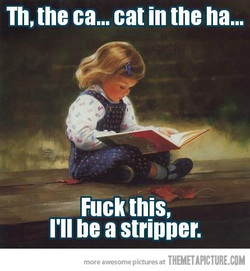 The thread began with the initial concern that a professor was giving too much reading to his students. Throughout the conversation I noticed two things 1) that most professors agree that 15-50 pages a week is a good amount of reading for the course and 2) the people who participate in this thread have too much to say and don't stick to the main question. As an English major, 15-50 pages assigned a week is like a walk in the park (even though I don't like walking in the park, but you get my gist). For students that don't have strong reading skills, the required reading is a balanced amount - some may struggle, some may not. The overall goal though should not focus on the amount of reading assigned, but the student's understanding and writing about the reading. Does a student's writing show understanding of the reading? Are students able to successfully find themes and write about them? Reading and writing are like peanut butter and jelly. If you get rid of jelly, the peanut butter isn't complimented; if you get rid of the peanut butter, the jelly isn't complimented. A man named Jerry Nelms wrote a lengthy explanation to this question that I found quite intriguing and important: "Back to the original question, has anyone mentioned that while the number of pages is an issue, more significant may be the level of difficulty. What we're really talking about here, of course, is Vygotsky's "zone of proximal development," defined pretty much as the difference between what a student can do with support (scaffolding) and what she can do without support, the idea being that we should aim assignments (including reading) at that zone between where the student perceives the task is too easy and where the student perceives the task is too difficult, that zone where the assignment is a challenge but where the student perceives she can accomplish it. As someone said, different students, different zones of proximal development, different perceptions of difficulty, different levels of self-efficacy (confidence in being able to accomplish the task)." I find that Nelms provides an accurate account of what professors will find in a FYC course. There is no right answer to the question about too much reading. A professor must get to know his students. The professor must find out their students' weaknesses and strengths before they can determine how much reading is too much reading. Most teaching is a process of trial-and-error. If a professor is giving too much reading, they will be able to tell by the lack of connections that their students are making between their reading and writing in the course. To answer the initial question: There is no definite answer. Pre-blog apologies: Hey guys, sorry about the late post. I was supposed to post yesterday, but obviously forgot. So here we go, my contribution to our cheeky little 493 blog. Hope you enjoy!
Stay frosty, Taylor _______________________________ As I was browsing LITSERV today, a thread entitled 'Writing for an online audience' caught my eye. There was a professor at a university that was slated to teach a composition class with the focus being on writing for an online audience. He didn't go into tremendous detail about what kind of "online audiences" or writing he would be teaching, but one can assume the writing would be including blogs, and other media venues in writing. That sounds a little familiar, no? Online writing can include many things. Is posting a Facebook status about your lunch considered online writing? What about a tweet that can't go over 140 characters? (that doesn't just include letters!!) Or does it simply focus on blog posting? As you can see, the list can go on and on about what kind of writing a person can do over the internet. I'm going to go off on a limb and say the original poster is going to be focusing on blog writing, something along the lines of what we're going to be doing for the rest of the semester. Writing a blog never turned out to be my cup of tea, but their popularity has been at an all time high over the past couple of years. Some people even make money off of writing blogs! That being said, what someone blogs about can be about anything. It could be from Game of Thrones, video game reviews, or even a classroom (oh hey!). A blog's audience can drastically change depending on what the blogger is posting about. My audience right now is you guys, my classmates and instructor. I'm not going to get the same readers that I would if I blogged about any of the other subjects I just mentioned. So writing online, in my opinion, is a very interesting and ever changing beast. Talk about cool, huh? The topic that seemed most interesting in the past few days on the WPA is that of plagiarizing oneself. Someone initially raised the question of whether it was common for universities to have specific policies regarding the "recycling" of student papers from one class to another. This particular poster's institution only defined plagiarism as taking someone else's work.
This post seemed interesting to me because it seems like a common practice for students to recycle papers whenever possible in both high school and college. There's been many a time I've had a conversation with a friend and been told that he/she has a paper due for so and so class but has a perfect paper already written that fits the criteria. What's interesting is that it seems colleges are much more concerned with students Surprisingly, the responses weren't all for condemning the practice, as long as some type of learning was taking place. The main argument from naysayers was that the practice of recycling papers undermines learning; a student can simply tweak the title and a few choice sentences to craft a new argument and pass the paper off as brand new. On the other hand, an argument is made that a student still learn from this process by being able to recognize the areas that requires editing and learn to craft language to fit specific arguments. In the realm of the composition class, I personally believe this practice only serves to enforce the idea that college students lack the fundamental writing skills necessary to be successful throughout their careers as students. There's a large number of students who haven't the slightest clue how to craft a coherent paper, and I say if they write one good one let them try and pass it in as many times as they can. There was a post in January about banned words from the dictionary. This year on the list was "hashtag" "selfie" and "twerk." While I think "swag" should be included, it is an interesting idea that these words can be banned. They're a pop culture reference that is finding its way into blogs, media, and papers!
With schools increasing their use of blog (example here of our class) and teaching of blogging, and internet writing these words are hard to deny. Especially hashtag, a common use for most sites for tagging topics. #Rhetoric #Pedagogy What's this mean for first year writing? Well, most students starting in college tend to hashtag their selfies. And most of us have opinions on this act, *cough* annoying *cough, cough*. They might write about them in stories describing themselves, or put them on their Moodle profiles. They're becoming part of the technology we use personally, professionally, and within education. I run a wordpress, and to get readers, you "Hashtag" your subjects as I did above to direct their interests when they search for it. Even Weebly has a categories option! Schools are using these mediums for educational purposes but then banning the word hashtag from the dictionary? That seems kind of circular, and not exactly appropriate. Selfie and twerk have become a part of our social networking life (or if you're me, not a part of it at all), so they are less likely to appear in a paper. Who wants to tell their professor about twerking in selfies? It is even more unlikely that a professor would make a student write about these subjects. These words make more sense than hashtag, as they are only part of the social networking life, and they shouldn't really appear in a classroom. Hashtag plays integral roles regarding blogging though, and while schools are increasing their usage of blogs, and teaching students to be better blog/internet writers, blocking hashtag is a death wish for those blogs. #RIP What do you think? Do you hate the word hashtag? -Jenn Here is a sample overview of a day's worth (or so) of the Writing Program Administrators Listserv. Even though it was a weekend, my colleagues in the field of Rhetoric and Composition were very busy posting to the list. The hot topic was in relation to a post by a newish faculty member wondering if she should take a WPA job while untenured. I can imagine what many of you thought about as you read this: What is a WPA? What's the big deal about tenure? And how is it possible this many people have this many different ideas about whether or not this woman should take the job? The WPA web page: http://wpacouncil.org/taxonomy/term/1550 Well, this particular topic is interesting to me because of all of the issues that come up. Being tenured is a big deal (I'll talk about it in class), and some institutions treat work like writing program administration (what a WPA does) as more like service--so you do it, but don't get credit for it. Also, I WAS an untenured WPA. And it really turned out pretty well for me. I got tenure (because at BSU doing a good job in a quasi-admin job means something--service generally means something here). Also, it opened up a lot of professional doors for me. On the down-side, I did not publish as much as I would have liked and so now it would be difficult for me to move to a different school if I wanted to. These are all points that get mentioned in the discussion of whether or not Pontefacto should take the job. We see a lot here--stuff about the brief history of Rhet/Comp. Stuff about Rhet/Comp in English departments. Stuff about working in higher ed generally--and how it looks very different in different places (an R1 versus a teaching institution like BSU with a 4/4 load). Stuff about tenure. Stuff about labor issues. How is this about teaching writing? No, seriously, I'm asking you, class, how is this about teaching writing? Other things got talked about: how much reading is it OK to assign. I thought you guys might be more interested in that discussion. I am a big advocate of teaching reading and not just assigning reading if first year writing. Also: job postings, calls for papers (presentations and publications), help with research surveys. Here is the original post that started the conversation. . .First time posting, so forgive me for barging into the discussion-- but I was hoping I could consult everyone here with a question concerning the specifics of reasonable release time for modest WPA responsibilities. I've been offered a jWPA/assistant professor position at a small liberal-arts college (enrolls ~500 students per year) with a two-course first-year writing sequence with ~25 sections per semester (mostly taught by adjuncts). It's a new position-- previously the WPA was carried out ad-hoc by chairs of English, the last of whom was recently denied tenure. The administrators seem vaguely dissatisfied with the current state of the program (which is currently entirely standardized, taught from a cobbled-together master syllabus) and are looking for someone to rationalize both the curriculum and the assessment. |

Blog493This blog is a reactionary overview of the daily posts to the Writing Program Administrator's listserv. One day; one blogger; lots of reactions. Archives
May 2014
Categories |



 RSS Feed
RSS Feed